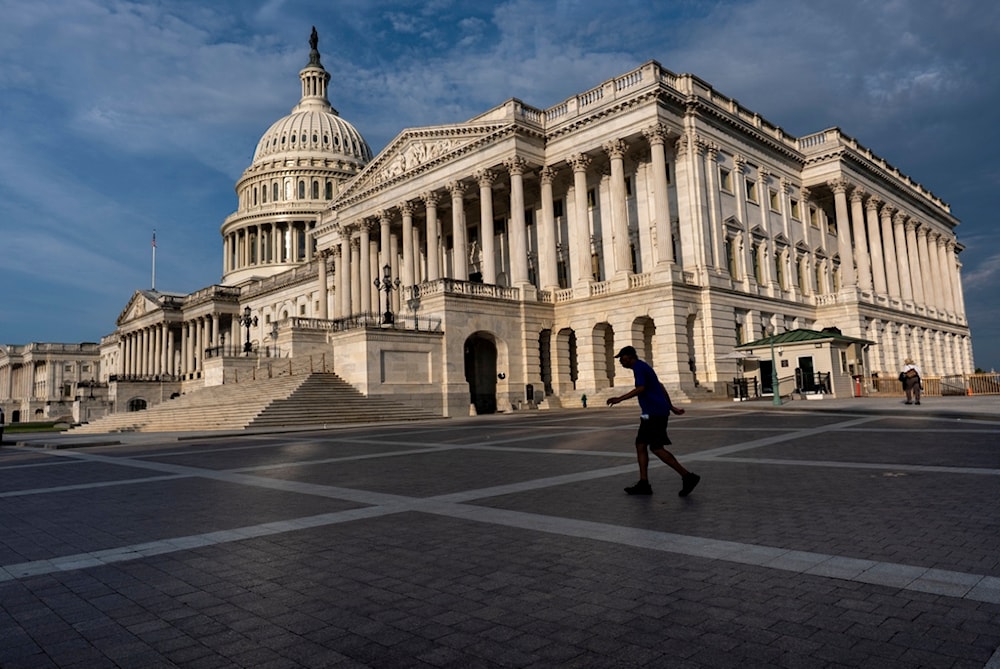Dems target GOP's 'Big Ugly Bill' to flip House in 2026: Axios
The legislation, formally known as the "One Big Beautiful Bill Act", narrowly passed the Senate earlier on Monday in a 51-50 vote, with Vice President JD Vance casting the tie-breaking ballot.
-

The US Capitol building is seen on June 30, 2025. (Francis Chung/POLITICO via AP Images)
Democrats are preparing to make a counter GOP-backed legislative package, which they've labeled the "Big, Ugly Bill," the centerpiece of their 2026 midterm campaign strategy, reported Axios on Wednesday.
The GOP's legislation, known as the "One Big Beautiful Bill Act", narrowly passed the Senate earlier on Monday in a 51-50 vote, with Vice President JD Vance casting the tie-breaking ballot. It extends the 2017 Trump tax cuts and boosts funding for border enforcement and the military, while also imposing deep cuts to Medicaid, food assistance, and clean energy tax credits.
On that note, a memo obtained by Axios, the Democratic Congressional Campaign Committee (DCCC) signaled its plan to target Republicans in competitive districts who supported the bill.
"These phony moderates all folded once – and their unwillingness to break from their DC Party Bosses will be the reason they lose next year," the DCCC wrote, adding that: "From now until November 2026, the DCCC will continue to communicate the harm this bill will cause. Republicans will lose the majority in 2026, and the Big, Ugly Bill will be the reason why."
Bill sparks backlash
Democrats are capitalizing on polling data that reveals widespread opposition to the legislation. Recent surveys show that a majority of Americans, over 55% in some cases, oppose the bill. Notably, even a significant portion of Republican voters have voiced concerns, particularly about provisions that undermine healthcare access and cut federal support for low-income families.
The bill, which initially passed the House in May, is now returning for a second vote to reconcile Senate revisions. Democrats argue that the renewed spotlight will only amplify the political risk for GOP incumbents, especially those in competitive swing districts.
The Congressional Budget Office estimates that the bill would add $3.3 trillion to the federal deficit over the next decade. Independent budget analysts warn that the actual cost could be even higher. Republicans have pushed back against these projections, arguing they overlook the bill’s potential to spur long-term economic growth.
The bill's Medicaid cuts are among the most controversial aspects, with estimates suggesting millions could lose coverage. Stricter work requirements and reductions in provider reimbursements could leave hospitals in poorer states overwhelmed, while health experts have warned of potentially thousands of preventable deaths annually.
Read more: Elon Musk slams Trump’s $5T spending bill
Democrats are framing the legislation as a direct threat to working families. Representative Jason Crow (D-Colo.) stated: "In all my time in Congress, this is one of the worst bills I've ever seen." On the Republican side, the bill is being touted as a major legislative achievement that reflects the party's commitment to fiscal conservatism and border enforcement.
"The One Big, Beautiful Bill is a big, beautiful opportunity to show how Republicans are delivering results," said National Republican Congressional Committee spokesperson Mike Marinella. He added, "Democrats are once again increasing taxes on hardworking Americans and putting politics over people. We won't let voters forget Democrats' betrayal next fall."
Midterm messaging war
Despite this rhetoric, the legislative process has exposed fractures within the GOP. Three Republican senators, Rand Paul (Ky.), Thom Tillis (NC), and Susan Collins (Maine) broke ranks and voted against the bill, citing concerns over its rushed passage and structural flaws.
House Minority Leader Hakeem Jeffries (D-NY) echoed the DCCC's message in a letter to colleagues, urging Democrats to continue highlighting the bill's unpopular provisions.
"Thanks to your efforts, the country is learning the truth about the One Big Ugly Bill. The more people know about it, the worse it gets for Republicans," Jeffries wrote, adding that "As we return to Washington, we must keep the pressure on the Republican extremists."
Read more: Senate passes Trump's tax bill, sends it to House for final passage
With the midterm season beginning to take shape, both parties are preparing for a messaging war. Democrats see a chance to capitalize on public discontent, while Republicans are betting the bill will appeal to their base and demonstrate legislative strength. The fight over the "Big, Ugly Bill" could prove decisive in determining control of the House in 2026.

 4 Min Read
4 Min Read










